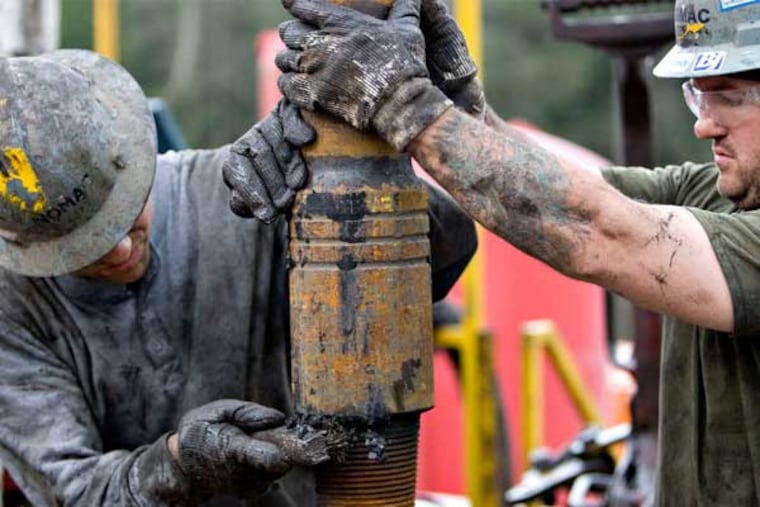What Pa. court's ruling on gas-drilling law means
Viewed narrowly, the Pennsylvania Supreme Court's momentous decision Thursday to strike down key provisions of the law that regulates natural gas drilling doesn't change anything at all.

Viewed narrowly, the Pennsylvania Supreme Court's momentous decision Thursday to strike down key provisions of the law that regulates natural gas drilling doesn't change anything at all.
The court's 4-2 decision restores local zoning control of drilling activity, which was in effect before the law known as Act 13 was passed last year. Despite having to navigate an uneven landscape of local zoning laws, Marcellus Shale gas producers flourished under the old rules.
But opponents of shale gas drilling say the court decision carries substantial symbolic and political weight. They hope it signals a reconsideration of state government's love affair with fossil fuels.
"With this huge win, we will move ahead to further undo the industry's grip of our state government," said Maya van Rossum, executive director of the Delaware Riverkeeper Network, whose standing as a plaintiff in the case was restored by the Supreme Court's decision.
The ruling may also revitalize the state's Environmental Rights Amendment, a 42-year-old law that guarantees Pennsylvanians' access to clean air and water.
Gov. Corbett and Republican legislative leaders said last week's ruling, written by Chief Justice Ronald D. Castille, also a Republican, had ominous implications for business.
"Our fear now is that landowners and hardworking individuals will suffer because of today's decision," state Senate President Pro Tempore Joe Scarnati and House Speaker Sam Smith, Jefferson County Republicans, said in a joint statement.
The ruling struck down provisions in Act 13 that stripped municipalities of the power to determine where natural gas drilling activity could occur within their boundaries. While Act 13 was under legal challenge, the old local zoning laws were still in force.
Corbett had pushed hard for the measure, saying the industry needed standardized rules to prosper. The gas industry had complained about dealing with potentially hundreds of different municipal zoning laws, including some that increasingly appeared to be designed to stymie drilling altogether.
Local governments argued that drilling was an industrial activity, just like a steel mill, that should be subject to zoning.
Establish limits
The court decision strikes down the law's provision allowing wells and pipelines in every zoning district, including residential neighborhoods, as long as certain conditions were met.
Castille and Justices Debra Todd and Seamus P. McCaffery agreed the provisions "sanctioned a direct and harmful degradation of the environmental quality of life in these communities and zoning districts."
The ruling restores the ability of municipalities to limit drilling to certain zones and to manage it with reasonable noise requirements and setback rules.
Towns are still not allowed to regulate technical aspects of drilling, such as construction standards, which remain the sole responsibility of the state Department of Environmental Protection.
"It's all about location," said John M. Smith, a Canonsburg, Pa., lawyer for the plaintiffs. "You can't place industrial activities in areas that will harm people."
Nor can municipalities ban drilling outright.
"We will still have to provide for drilling operations in municipalities, albeit now not in residential areas, or near schools, churches, playgrounds," said Smith, solicitor for several Southwestern Pennsylvania towns that were plaintiffs in the case.
The lawsuit was initiated by rural Robinson Township, a Washington County community west of Pittsburgh where five gas-drilling companies have drilled about 20 horizontal wells so far. Each company has its own pipeline system.
"We just enacted some commonsense rules," said Brian Coppola, chairman of the township supervisors. "We certainly didn't try to ban it."
The legal challenge in Pennsylvania is part of a broader national resistance in states where the shale-drilling boom has led to a domestic renaissance in oil and gas production.
Winners and losers
Though the energy bonanza has generated substantial benefits - new wealth and jobs, lower energy costs, a reduced reliance on imported energy - objections to drilling's impact on health and the environment is mounting, even in states like Colorado and Pennsylvania, where laws traditionally favor development of natural resources.
"Society at large is reaping the benefits of this boom," said Andrew R. Kear, a geologist and political scientist at Ohio's Bowling Green State University who is studying the cultural clash. "But the costs and burden are being borne by people on the local level."
Act 13 imposed some stricter environmental rules on drilling: new disclosure standards for the chemicals used in hydraulic fracturing; lengthened setbacks to keep wells farther from homes and waterways; and higher standards for emergency containment.
The act also created an impact fee, which imposes an annual tariff on wells that generated $400 million in revenue for the first two years. Though the court ruling did not address the constitutionality of the impact fee, some legislators believe the decision also threatens its validity.
Major parts of Act 13 likely will need to be rewritten by the General Assembly, which may prompt another round of litigation.
But some legal experts say the impact of the court ruling may extend well beyond Act 13.
Castille and two other justices based their ruling on Pennsylvania's Environmental Rights Amendment of 1971, which guarantees Pennsylvanians "a right to clean air, pure water, and to the preservation of the natural, scenic, historic, and aesthetic values of the environment."
The environmental amendment "has been marginalized by the courts from the outset," said John C. Dernbach, a Widener University law professor who is codirector of the Environmental Law Center in Harrisburg.
Dernbach said the court ruling Thursday "breathed new life" into the environmental law, the implication of which "will be felt for years, perhaps decades."
215-854-2947
@maykuth